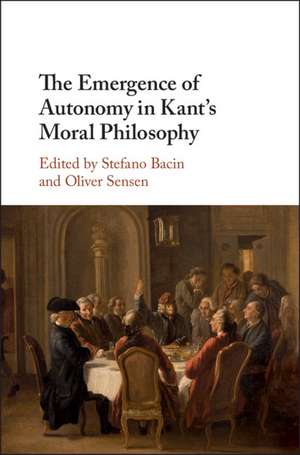The Emergence of Autonomy in Kant's Moral Philosophy
Editat de Stefano Bacin, Oliver Sensenen Limba Engleză Hardback – 24 oct 2018
| Toate formatele și edițiile | Preț | Express |
|---|---|---|
| Paperback (1) | 282.48 lei 6-8 săpt. | |
| Cambridge University Press – 5 aug 2020 | 282.48 lei 6-8 săpt. | |
| Hardback (1) | 691.66 lei 6-8 săpt. | |
| Cambridge University Press – 24 oct 2018 | 691.66 lei 6-8 săpt. |
Preț: 691.66 lei
Preț vechi: 777.15 lei
-11% Nou
Puncte Express: 1037
Preț estimativ în valută:
132.35€ • 141.53$ • 110.35£
132.35€ • 141.53$ • 110.35£
Carte tipărită la comandă
Livrare economică 17 aprilie-01 mai
Preluare comenzi: 021 569.72.76
Specificații
ISBN-13: 9781107182851
ISBN-10: 1107182859
Pagini: 238
Dimensiuni: 156 x 235 x 16 mm
Greutate: 0.45 kg
Editura: Cambridge University Press
Colecția Cambridge University Press
Locul publicării:New York, United States
ISBN-10: 1107182859
Pagini: 238
Dimensiuni: 156 x 235 x 16 mm
Greutate: 0.45 kg
Editura: Cambridge University Press
Colecția Cambridge University Press
Locul publicării:New York, United States
Cuprins
Introduction Stefano Bacin and Oliver Sensen; 1. How is moral obligation possible? Kant's 'principle of autonomy' in historical context Heiner F. Klemme; 2. Anticipations of autonomy: freedom, obligation, and the concept of a world in Kant's writings of the Mid-1750s to Mid-1760s Susan Meld Shell; 3. Autonomy and moral rationalism: Kant's criticisms of 'rationalist' moral principles (1762–85) Stefano Bacin; 4. Autonomy and moral empiricism: Kant's criticism of sentimentalist moral principles (1762–85) Georg Mohr; 5. Elements of autonomy in Kant's Lectures on Ethics (1770–80) Oliver Sensen; 6. Emerging autonomy: dealing with the inadequacies of the 'canon' of the Critique of Pure Reason (1781) Jens Timmermann; 7. Autonomy and the legislation of laws in the Prolegomena (1783) Eric Watkins; 8. How can freedom be a law to itself? The concept of autonomy in the 'introduction' to the Naturrecht Feyerabend lecture notes (1784) Marcus Willaschek; 9. Moral autonomy as political analogy: self-legislation in Kant's Groundwork and the Feyerabend lectures on natural law (1784) Pauline Kleingeld; 10. What emerged: autonomy and heteronomy in the Groundwork and second Critique Andrews Reath; 11. Kant's threefold autonomy after the Groundwork: reason's own law-giving as our own cosmopolitan law-giving Pierre Keller.
Recenzii
'For those interested in the details of how Kant came to develop his view of autonomy, and the various precursor views he developed and engaged with on the way there, this book is an excellent and welcome addition to the literature.' Notre Dame Philosophical
Descriere
A thorough study of why Kant developed the concept of autonomy, one of his central legacies for contemporary moral thought.
